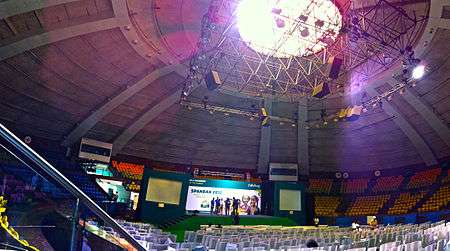Talkatora Stadium
 | |
| Location |
|
|---|---|
| Coordinates | 28°37′20.84″N 77°11′34.53″E / 28.6224556°N 77.1929250°ECoordinates: 28°37′20.84″N 77°11′34.53″E / 28.6224556°N 77.1929250°E |
Talkatora Indoor Stadium (Hindi: तालकटोरा स्टेडियम) is an indoor stadium located in New Delhi, India.[1] The stadium has a capacity of 3035 people. The stadium is owned and managed by the New Delhi Municipal Council (NDMC).[2]
History
It is named after a Mughal-era garden, known as Talkatora Gardens. A tal (tank) situated at the west side of the garden, is surrounded by hilly ground (part of the Delhi ridge, forms a katora, bowl-shaped natural depression), which gives the place its name.[3]
Upgraded Talkatora Indoor Stadium was inaugurated on 25 February 2010. The stadium is a unique piece of architecture with an elegant look. The stadium was a venue for the 2010 Commonwealth Games for the event of boxing. There was a star night to raise funds for the Kargil War relief fund.[4] During November 1978, Leftists organized a national delegate session here which was attended by more than 7,000 trade union delegates.[5]
Overview
The stadium has one competition ring and four warm-up areas. The stadium has a tunnel to facilitate movement of the athletes from the Facility Block to the main stadium. The stadium has been connected to a tunnel which is used by the athletes, it has multiple facilities which include acoustic ceiling of dome, scoreboard, video screens and sports lighting. A number of environment-friendly material and energy-efficient devices have been used in this block to make it a green building.

References
- ↑ India. R.I.C. Publications, 2010. p. 101. ISBN 978-1741269116.
- ↑ "Talkatora Indoor Stadium" (PDF). NDMC. Retrieved 2013-09-24.
- ↑ "Mughal-era link to swanky stadium campus in heart of capital". Hindustan Times. March 30, 2013. Retrieved 2013-09-24.
- ↑ English Core. Rachna Sagar. ISBN 978-8181372307.
- ↑ Ghosh, Arjun. Theatre of the streets. Sudhanva Deshpande, Jana Natya Manch (Jana Nāṭya Mañca).